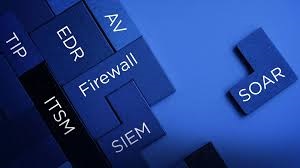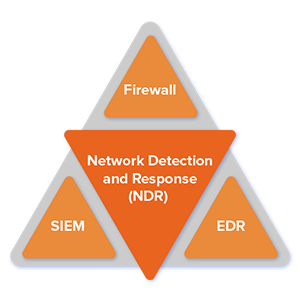EDR Firewall Benefits: Managing network security risks is a constant worry for every company, and how you do it depends on the measures you take to protect your network. Knowing the primary distinction between these two choices will help you choose which is ideal for your company and network.
How do endpoint detection and response (EDR) solutions vary from the firewall? The primary distinction between the two is how risks are identified and dealt with, whether proactively or reactively.
Though phrases like "antivirus," "endpoint detection and response," and "firewall may seem more at home in a medical setting, their importance in endpoint security cannot be overstated. Let's learn is EDR a firewall or how it differs from each other.
EDR Firewall Benefits: Endpoint Detection and Response (EDR) is a relatively new endpoint security solution defined in 2013. It focuses on threats targeting network endpoint devices and provides network security teams with timely information on the threat or assault occurring. Without EDR security technologies, visibility into distant endpoints is difficult for endpoint security teams.

With EDR detecting and responding instantly to endpoint assaults, the network may be protected by isolating the endpoint device, executing automatic responses, and blocking any processes traveling between the device and the web. Also, you might at times think that is EDR a firewall? And the answer for this will be ahead.
FirewallA firewall is a security device for a computer network that limits the amount of incoming, outgoing, and internal data transfers with the internet.
To perform its duty, this program or specialized hardware-software unit will either arbitrarily block or allow certain data packets. Its typical function is to protect a private network from intrusion by outside parties and to stop users from accessing inappropriate websites.
Firewalls are like guarded entryways that control what data may and cannot pass via a private network. The word originates from the idea that walls might act as barriers to spreading fire until they can be extinguished by emergency personnel. Firewalls, on the other hand, are used to control the traffic flow on a network and are designed to prevent or at least slow the development of online dangers.

What Role Does EDR Play Alongside Firewall?
The EDR system was developed with the idea that the endpoint would be compromised. A firewall may provide excellent protection, but if it fails, the business loses all insight into what is occurring on the endpoint. Security personnel cannot gain quick access to the endpoint to resolve a breach.
EDR Firewall Benefits: Once a threat has breached the endpoint's defenses and infected the system, an EDR system goes to work.
- Detection of a compromised endpoint
- Take immediate, automatic action, such as isolating the endpoint, to stop the threat.
- Help security analyze the event by providing forensic data.
- Help security personnel contain and mitigate threats by giving them remote control over groups of endpoints.
What Kind of Virus Protection Does Your Company Require?
Network endpoint security decisions involving firewall vs. Endpoint Detection and Response (EDR) often come down to whether or not an organization has the workforce and infrastructure to use an EDR security solution fully.
Due to a lack of dedicated network security personnel, EDR may not be the best choice for small enterprises without their own IT teams. However, companies with an IT department and the tools they use would benefit immensely from an EDR security solution compared to a firewall. Since if thinking is EDR a firewall then yes works in the same manner.
EDR Firewall BenefitsEDR's security enhancements over antivirus lie in the fact that they compensate for the weaknesses of antivirus programs. Here how EDR helps:
- Enhancing Detection
Behavioral monitoring is an integral part of EDR systems. In other words, software that mimics the behavior of a virus will be dealt with in the same manner. Unlike traditional antivirus, EDR systems may begin blocking malware and assaults as soon as they are detected rather than waiting for a virus to be identified.
Either the antivirus software detects the infection or it isn't. EDR tools that see suspicious activity keep tabs on potential threats, allowing security professionals to take additional action and investigate any suspicious activity.
- Time to Detection Is Shortened
A faster detection rate is crucial as automated and aggressive attacks become more common. It's more expensive to respond to an attack and mitigate its effects on an organization if it takes too long to identify an intruder.
There is no need to scan for viruses or update a list before using an EDR. The files, processes, and behavior are constantly evaluated, and if something suspicious is found, the scanner can immediately terminate the activity, isolate the endpoint, or notify the security team.
- Possibilities Increased
Regarding virus removal, EDRs are on par with antivirus software. They also offer expanded response options, including reporting abnormalities, isolating affected devices from the network, and even giving remote access to security investigators. Firewalls, allow listing, and other security features, as well as extensive monitoring, are all a part of an EDR's extended security suite of capabilities.
- Comprehensive Response
Managed EDR can offer a comprehensive managed incident response capability in addition to endpoint protection. With managed EDR in place, the first line of defense is strengthened, and even the most complex assaults may be identified, analyzed, and prevented.
More current assaults can be stopped with managed EDR, and the risks and costs associated with investigating and recovering from future attacks can also be reduced.
Conclusions
EDR Firewall Benefits - This information works for you to know is EDR a firewall. Since EDR's higher level of security is essential for effectively managing hazards in the modern, interconnected environment.
The 'cheap' alternatives provided by antiquated technology carry the threat of substantially greater expenses down the road. There is no need for a responsible business to take such chances.